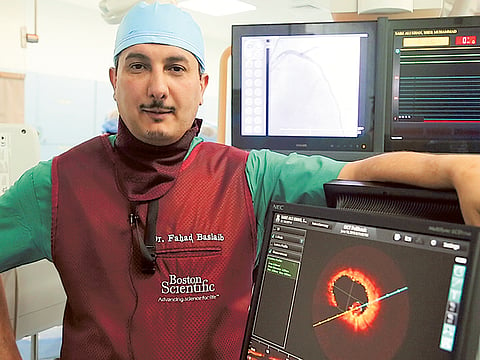Dissolvable stent saves life of cardiac patient
Biodegradable scaffold absorbed by body within three years

Dubai: A 49-year-old heart attack patient was granted a new lease of life when a Dubai hospital put in three new generation bio-degradable scaffolds in a major artery of his heart that was 90 per cent blocked.
The new Bioresorbable Vascular Scaffold system (BVS) is different from a conventional drug-coated stent as it dissolves completely without a trace within three years.
The surgery done by Dr Fahd Omar Baslaib, interventional cardiologist and head of cardiology at Rashid Hospital, involved coronary angiography and angioplasty. It took place on June 18 and was telecast live in Florida to help 3,000 interventional cardiologists learn the methods to overlap multiple scaffolds. Dr Baslaib teaching other doctors while working on the case reversed the trend of live surgical telecasts usually coming from the West.
In an exclusive interview with Gulf News, Dr Baslaib elaborated on this procedure: “Using BVS instead of conventional stents started in 2012 and after Europe we were the first country in the Middle East to do this. However, this new generation BVS has more pushability to navigate and place itself in the correct position in the artery and this kind of scaffold was used for the first time in the region. The special fibre optic camera, which follows the placement of the scaffold, ensures that it is placed correctly leaving no space in the arterial wall for any chance of a clot to form.”
The patient, a 49-year old South Asian, was brought into the emergency ward with heart attack symptoms. Investigations at the cath lab revealed a 100 per cent block in one artery which was immediately opened with angioplasty and conventional procedure. “However, further investigation revealed that the patient had a 90 per cent block in his Left Anterior Descending Artery (LADA) which supplies nearly two-thirds of blood-supply to the heart,” Dr Baslaib said.
Merits of bio-absorbable scaffold
These new generation scaffolds have an advantage over conventional stents as they disappear from the arteries, breaking down into carbon dioxide and water in about three years. The by-products — carbon dioxide that it releases — is exhaled and water is absorbed by our bodies, Dr Baslaib said. “We do advise them to cut down smoking, have a balanced diet, work out and take medication for prevention of any more plaque. However, in the case of a young patient the chances of this are greater and he could require the placement of another such scaffold. Also, patients who do not respond well to medication come back with blockages. When a conventional stent is used, it turns the artery into a metal cage and alters its basic motion. However the bio-absorbable scaffold dissolves completely, allowing for future placements of similar scaffolds or even bypass surgery later,” he said.
Dr Baslaib placed three scaffolds in the artery through angioplasty and demonstrated the technique of multiple overlap to the cardiologists watching the procedure live. The keyhole procedure warranted quick recovery and the patient was discharged the next day and is reported to be doing well.
The conventional stent surgery costs Dh8,000 at Rashid Hospital while the BVS costs Dh12,000, Dr Baslaib said.
Dr Fahad Baslaib said that annually about 2,000 patients undergo angiography at Rashid Hospital. This is an investigative procedure and of these 60 per cent require angioplasty which is a therapeutic procedure. Of these nearly 1,000 people require stents. In some cases individuals require more than one stent.
He also said that the average age in the UAE for heart patients requiring stents is 45.
Sign up for the Daily Briefing
Get the latest news and updates straight to your inbox



